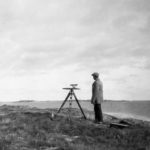We run our website the way we wished the whole internet worked: we provide high quality original content with no ads. We are funded solely by your direct support. Please consider supporting this project.

A Cruciform Dialectic
One of the most important aspects of God’s action on Calvary, I believe, is this: God revealed himself not just by acting toward humans, but by allowing himself to be acted on by humans as well as the fallen Powers. God certainly took the initiative in devising the plan of salvation that included the Son of God becoming human at “the right time” for him to get crucified (Rom 5:6). And God was certainly taking the initiative as Jesus taught and acted in provocative ways that were certain to get him crucified. Hence, Scripture says that part of God’s “deliberate plan and foreknowledge” was to have Jesus handed over (Acts 2:23) to wicked people to do what God’s “power and will had decided beforehand” should be done (Ac 4:28).
At the same time, as active as God was in revealing his nature on Calvary, we must also notice that this revelatory act took place by God allowing wicked humans and forces of evil to act out their wicked and violent intentions against Jesus. Indeed, the physical and verbal assaults Jesus absorbed in the process of being crucified were actually just a microcosm of the sin of the world that Jesus absorbed on the cross, thereby allowing every human throughout history to act on him.
It is within this dialectic of acting and being acted upon that God communicates his true identity, and given that his true identity is humble, self-sacrificial love, it’s hard to see how it could have been otherwise. A deity whose essence was power could reveal himself by unilaterally acting upon others, but not the one true triune God whose eternal existence is an unending act of three divine Persons giving themselves wholly over to one another.
As the biblical narrative attests, and as Calvary makes most explicit, God is a God who humbly makes space for agents whom he has created to possess a degree of autonomous “say-so” in effecting what comes to pass—even to the point that their “say-so” influences, and in limited ways, thwarts, God’s “say-so.” Hence, God’s typical way of working in and through human agents is by means of influence, not coercion. God respects the relative autonomy, personhood and free will of people, to say nothing of angels. And this is, at least in part, why his way of rescuing us from the prison we have placed ourselves in is a slow, gradual, arduous process that involves a great deal of patience and self-sacrifice on God’s part. For the same reason, it is a process that involves God relying on his wisdom rather than merely relying on his power to accomplish his purpose, as the quintessential revelation of God on Calvary makes clear and as Scripture repeatedly stresses.
The cross is thus the full revelation of God’s character precisely because it wasn’t a unilateral action of God toward humans but rather came about, in part, by God humbly allowing human and angelic agents to engage in hostile activity against God. For this same reason, the cross was not merely a revelation of God’s power but also of God’s wisdom. God wisely turned the evil he absorbed into good, including the good of glorifying his Father by revealing his true self-sacrificial character and freeing humans from their oppression to sin and the devil.
Photo via Visual Hunt
Category: General
Tags: Character of God, Cross, Cruciform Theology, Love
Topics: Attributes and Character
Related Reading

Did God Destroy Sodom and Gomorrah? (podcast)
Greg considers the destruction of Sodom and Gomorrah and speculates on the nature of the angels who were sent there. Episode 597 http://traffic.libsyn.com/askgregboyd/Episode_0597.mp3

Why do some of Jesus’ parables depict God in violent ways?
Greg deals with the question of what it means that some of Jesus’ parables seem to depict God in violent terms. In addition to getting an answer to this question you’ll be treated to a window into Greg’s graceful way of moving through the world. Really classy. Enjoy!

God’s Heart to Prevent Judgment
In Ezekiel we read a passage that depicts Yahweh as warning his people about their impending punishment by saying, “I will pour out my wrath on you and breathe out my fiery anger against you” (Ezek 21:31a). As we find in several other texts, Yahweh is here depicted as a ferocious fire-breathing dragon—a portrait that…

Tribalism
Sandra Unger spoke for Greg while he was on vacation the week after the 4th. In this clip, Sandra explains whats tribes are and how that creates unintended separation between people. In the full sermon, she speaks about what it means to be part of the Jesus Tribe. She discusses the reasons people are prone to…

Does God Inflict Physical Disabilities?
In Exodus 4, we find Moses claiming that he could not be used by Yahweh to get the children of Israel out of Egypt because he was “slow of speech and tongue.” To this Yahweh replies, “Who gave human beings their mouths? Who makes them deaf or mute? Who gives them sight or makes them…

Podcast: Isn’t God the Author of Suffering in the Crucifixion?
Greg considers the implications of his Cruciform Hermeneutic on his previous work in God at War. http://traffic.libsyn.com/askgregboyd/Episode_0274.mp3
